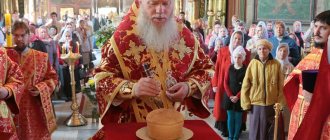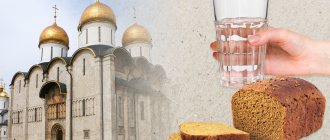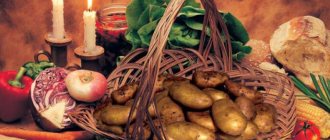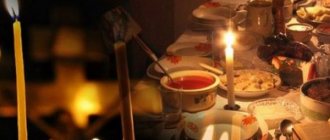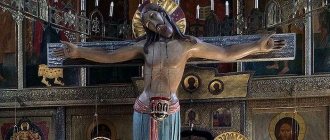Peter's Fast (Apostolic Fast, Petrovka ) is one of four multi-day annual fasts, which was established in honor of the holy apostles Peter and Paul, who fasted in order to prepare themselves for the gospel preaching (Acts 13: 3). Peter's fast begins a week after Trinity and, unlike all other multi-day fasts, has a different period in duration: from 8 to 42 days, depending on the Easter cycle. It always ends on the day of memory of Peter and Paul, July 12 (June 29, old style).
Petrov fast in 2022 - from June 20 to July 11
According to the rules by which the Orthodox calendar is compiled, in June 2022 Petropost begins on the 20th and ends only in the next month: July 11th.
The start date of the church fast is not fixed. It depends on the date of the celebration of Great Easter and Trinity. Believers begin to abstain from food when exactly 7 days pass after this Great Holiday. As a rule, fasting begins on Monday.
Believers know that the duration of this fast also varies, because it always ends on July 12, and begins depending on the date of Easter. Abstinence from fasting in the summer lasts from 8-42 days.
What is the main point: to prepare Christians for the church holiday in memory of the apostles Peter and Paul. In July 22, however, as always, this day is celebrated on the 12th. The schedule according to which you should fast can be found in the church calendar.
The week before Peter's Fast ends with a fast. On this day, all Orthodox believers can eat fast food (this is the name given to food containing animal fat). The 22nd anniversary will be on June 19th.
The next post after Petrovsky is Uspensky (people will observe it from 14.08-27.08).
For what purpose was the Apostolic Fast established?
The tradition of Peter's Fast developed gradually in the Church. Historical sources of the first centuries of the Church speak only of the original tradition of “fasting after Pentecost.”
"For the past post"
St. Hippolytus of Rome in the “Apostolic Tradition” (III century), containing various rules of Christian life, writes that after the Day of the Holy Trinity those who, for any reason (long journey, illness) did not observe bodily and spiritual restrictions, should abstain before Easter. Since fasting during the Easter days of joy is inappropriate, this activity is postponed until after all the celebrations have ended.
"After Relaxation"
An ancient source, the so-called “Apostolic Constitutions” (their authorship is attributed by tradition to St. Clement, Pope of Rome, but modern theologians consider the text to be later, created around 380) indicates that:
- Pentecost is celebrated for a week;
- then follows abstinence, which lasts only 7 days. “For it is right that you should rejoice in the gift of God and fast after the indulgence.”
By “relaxation” we mean the long celebration of Easter, Ascension, Trinity, a time of universal joy, which, however, carries the danger of spiritual cooling due to infatuation with worldly pleasures. A short post was supposed to relieve this relaxation.
What is the essence of Petrov's fast?
Why you shouldn’t eat meat during this period: people do this in memory of an important event. Many years ago, the Holy Apostles Peter and Paul began to fast on June Day and continued until the time they both began to preach the Christian faith.
The meaning of abstaining from excessive nutrition: achieving personal self-improvement, cleansing the body and soul of everything superfluous and unnecessary. These days, sincere repentance, reading prayers and attending church services also help to achieve unity with the Lord God. Having been united by a common idea, people feel like one, their connection with the church becomes stronger.
Supreme Apostles
Holy Chief Apostles Peter and Paul with Lives
So, during the first centuries of the existence of the Church, the fast dedicated specifically to Peter and Paul was apparently unknown. But the saints themselves, the “pillars of the Church,” were deeply revered by believers. Their special role can be seen already in the Gospel, as well as in the “Acts of the Apostles”, written by St. Luka.
The most zealous
It is not for nothing that Simon Peter, the most steadfast of the Lord’s disciples, was called by Him “the rock” in the foundation of the Church. In many chapters of the Gospel we see him constantly accompanying Christ in the most important moments of His earthly life:
- Simon was one of the first called by Christ to serve; without hesitation, according to the word of the Savior, he left his job as a fisherman, his home, his wife, and went to wander with Christ;
- he is one of the three disciples who were present at the resurrection of the Lord's daughter Jairus (Mark 5:35-43);
- Peter, and not any other of the frightened disciples, boldly asked the Lord, walking on the stormy sea, permission to also walk on the waters (Mark 6:47-51);
- the name of Peter is called by the Evangelists among those with whom the Lord went to the Mount of Transfiguration - Tabor, and the Apostle is named first (Matt. 17: 1-6; Mark 9: 1-8);
- Even at the Last Supper, Simon is the leader; he most ardently proves to Christ his readiness to go “to prison and to death” (Luke 22:33), and he tries more persistently than others to find out who will betray Christ.
Peter's zeal for God was great, but his fall was also terrible. When the Teacher was taken by the hands of the wicked, not long ago such a hot, fiery Simon denied Him three times.
Pious tradition says that the Risen Christ appeared to him, endlessly grieving over what he had done. And the Evangelist John (John 21:15) conveys the conversation of Christ with His disciple, a threefold questioning:
“Simone Ionin, do you love Me?”
Peter understands everything: why the Lord does not call him Peter (“petrus” - in Greek “stone”, a symbol of firmness), why he asks three times, according to the number of his denials. From the depths of his contrite heart his cry is heard:
"God! You know everything, You know that I love You!
This – love for God – determined his life until the very end. Having traveled many lands with the gospel, having visited Rome itself more than once, he never forgave himself for his renunciation: when the imperial authorities condemned the Apostle to crucifixion, Peter asked to hang him upside down so that the suffering and pain would become greater.
Teacher of the Gentiles
The mission of Paul turned out to be completely special (before the calling of the Lord - Saul). The Gospels do not mention his name even once, which is understandable. Having grown up among educated Jews, Saul was initially infinitely far from the followers of the preacher from Nazareth and the teachings that questioned many of the customs and traditions of Judaism.
Especially the believer, burning in spirit, Saul was outraged by the idea of Jesus as God coming to earth. “The Pharisee, the son of a Pharisee,” as he called himself, in excessive jealousy persecuted Christians as blasphemers, offenders of Jewish law.
Until one day, going to the Syrian city of Damascus to arrest the followers of the hated teaching, he, illuminated by a great light, saw Christ Himself - truly God and Man.
Saul didn’t just change his name to Paul—his life changed. Knowing well that a Jew is forbidden to even eat with pagans, Paul now goes to them, who never knew the true faith, lives among these people, communicates with them, baptizes many people.
St. Luke, Paul’s friend and companion, says that more than once the saint had to explain his actions to the Jerusalem Christians from the former Jews, and even sometimes argue with Peter about the possibility of observing the Law of Moses for the pagans.
Later, looking back on the years he had lived, Paul noticed with surprise how many communities he founded, how many people he led to the Lord:
“... I have labored more than all of them: not I, however, but the grace of God, which is with me” (1 Cor. 15:10).
The path of both saints ended in Rome. The Christians of the “Eternal City” remembered the date – July 12 (NS) 66 or 67 as the day of their execution. Until now, historians and theologians do not have a common opinion whether they were killed by order of Emperor Nero in 66, or several years between the death of Peter and the death of Paul.
But they were not simply remembered as people who had once lived: as during earthly life, believers continued to turn to their mentors who were in the Kingdom of Heaven. After all, for a Christian there is no death.
Veneration of the Apostles
By the time the anti-Christian persecution ceased under Emperor Constantine the Great (306-335), the Church had long ago developed a special attitude towards Peter, as the supreme disciple of Christ, and Paul, the “apostle of the pagans”. The reverence that Christians felt for the holy apostles begins to be expressed not only in prayer, but also in the construction of churches.
In Rome
In 324 or 326, Constantine the Great ordered the construction of a small church (basilica) on the site of the gardens of Emperor Nero, where the Apostle Peter suffered. The altar of the temple was built on the site of his grave, which had long been known and was revered by Christians for several centuries.
In those same years, a temple was built on the site of the execution of the Apostle Paul, outside the city limits, which was also known and revered by Christians.
18
November
324 years
The basilica in honor of the Apostle Paul was consecrated by St. Sylvester, Pope of Rome.
Currently, on the site of Peter's Basilica there is the famous St. Peter's Cathedral, St. Basilica. Paul is one of the 4 “great basilicas” (temples with a special status) of the “Eternal City”.
In Constantinople
After the capital of the empire was moved to a new city, Constantinople, special veneration for the apostles was manifested there as well. Around 330, the emperor ordered the construction of the Basilica of the Apostles here. This temple is the only one that appeared in Constantinople during the lifetime of its founder.
In 337, the king was buried here in a marble sarcophagus. His son, Constantius, brought here sacred relics - the relics of the apostles Andrew the First-Called, Luke and the disciple of St. Paul, Timofey.
Subsequently, the church became the family tomb of the Byzantine emperors. The patriarchs were buried here. In the 6th century, under Emperor Justinian, the basilica was greatly rebuilt and expanded: the king feared that the Apostolic Church might lose its significance against the backdrop of the magnificent Hagia Sophia.
The shape of the five-domed basilica, the second most important temple of Byzantium, became the prototype for many Christian churches. For example, this kind of architecture is still widespread in Russia. But the basilica itself has not survived to this day: since 1461, in its place has been the Fatih Mosque.
History of origin
The description of the events that led to the emergence of Peter's Fast is associated with the first centuries of the spread of the Christian faith. At first it was believed that those believers who did not fast during Lent should adhere to it.
The period of summer abstinence from food was especially significant in Rome and Constantinople. In these cities at that time, churches were erected in honor of the Holy Apostles. Petrovka was approved only towards the end of the 4th – beginning of the 5th centuries. In Rus' they began to observe it after the adoption of Christianity. He replaced the Kupala rituals, which were observed by the pagans.
What Holy Scripture tells us about spiritual and physical abstinence
The Old Testament already knows fasting. St. Basil the Great was one of the first to draw attention to the fact that fasting as self-restraint appeared already during the dwelling of the first people in Paradise. The commandment given to Adam forbade eating from one of the trees of paradise (Gen. 2:17). But man was unable to meet even this single requirement. After the Fall, restoring Communion with God requires much greater efforts from a person.
This was already understood by the ancient Jews, who began fasting at least since the time of the prophet Moses:
- in purifying oneself in the face of the holiness of God;
- in asking the Lord for help and mercy;
- in repentance for the sins committed.
The fasts of the Jewish tradition can be divided into:
- observed under special circumstances; for example, on Mount Sinai, the prophet, leader of the people of Israel Moses, “with the Lord for forty days and forty nights, he did not eat bread or drink water; and he wrote on the tablets the words of the covenant, the ten words” (Ex. 34:28);
- The residents of the city of Nineveh, which the prophet held, kept a penitential fast. Jonah predicted the Lord's punishment for their sins;
- prescribed abstinence on certain days; So, for the Jews, these were the 10th day of the month of Tisri (for the cleansing of sins), the 13th day of Adar - as a memory of the wife of the Persian king, the Jewish woman Esther, who saved her people from extermination, as well as others;
- a fast that an individual imposed on himself, usually under difficult circumstances requiring God’s help; An example of such spiritual work is the grief of King David over his sick son, who had to die for the sin of his father by the righteous judgment of God; The king poured out his grief in the psalm “Have mercy on me, O God, according to Your great mercy...” (Ps. 50)
In all these cases, in addition to special prayer, fasting also consisted of complete abstinence from food and drink. This generally accepted rule was also observed by the New Testament ascetics, an example set by Christ Himself, who observed complete abstinence for 40 days in the desert before the start of His preaching (Matthew 4: 1-2). It was because of this established tradition that the Church until the 4th century. I didn’t know multi-day fasts - maintaining such abstinence would be very difficult.
Fasting in the New Testament
With the coming of the Son of God into the world, the approach to abstinence began to gradually change. As before, fasting remained necessary in emergency circumstances requiring God's help. For example, to the disciples who, no matter how hard they tried, could not cure the demon-possessed youth, the Lord sternly says:
“This generation is driven out only by prayer and fasting” (Matthew 17:21).
"Sons of the Bridal Chamber"
And yet, something has changed, this was noticed by the Pharisees who were closely watching the Savior: the disciples of Christ did not observe the fasts established by Judaism. The Teacher’s answer to the lawyers’ perplexed question turned out to be discouraging for them:
“Can the sons of the bridal chamber fast when the bridegroom is with them? As long as the bridegroom is with them, they cannot fast” (Mark 2:19).
However, the Lord does not deny the doing itself, only explaining:
“But the days will come when the bridegroom is taken away from them, and then they will fast” (Matthew 9:15).
This is how the joy of meeting the Lord is brought into the work of fasting. To this day, Christians spend the time when He is especially close - Christmas, Easter, Pentecost - in spiritual joy, without fasting.
Rules of Petrov's Fast
Rules of fasting from the Apostle Paul and Peter:
- It is necessary to stop drinking alcohol and smoking. On Saturdays and Sundays, as well as on church holidays, you can drink a small amount of red wine.
- You are not allowed to attend any entertainment events during this time. Family celebrations can be celebrated. But this must be done without merry feasts and in accordance with the rules included in the Church Charter.
- You should free your mind from bad thoughts. You cannot quarrel with people, feel envy towards them and condemn them in every possible way.
- It is advisable to limit television viewing.
- It is not recommended to hold a wedding in Petrov Post. Weddings are prohibited.
- You cannot guess and take part in various magical rituals.
- Conceiving a child these days is not encouraged. The fulfillment of marital debt is possible only by mutual consent of both parties.
Everyone can attend the service in the church on July 12, confess and receive communion.
Features of the service of the Feast of the Holy Apostles: in honor of the celebration, priests wear white and yellow vestments.
In general, according to church rules, Peter's Fast is considered non-strict.
What can you eat on Petrov fast?
Food of animal origin should be excluded from the daily diet: meat, dairy products, eggs. On Wednesdays and Fridays, it is not allowed to eat fish and seafood, or to consume warm food seasoned with oil. But on other days, fish is allowed. The basis of the diet should be foods such as cereals, berries and greens. It is allowed to consume green cabbage soup not in meat broth, okroshka and botvinya.
Monks observe fasting more strictly than laypeople. Each parishioner can approve a personal nutrition calendar. The characteristics of the body and the state of health of the believer are taken into account.
Who is eligible for relief:
- military personnel serving in different types of troops;
- people who perform heavy physical activity;
- athletes.
Expectant mothers and breastfeeding women are completely exempt from any restrictions. Children should not be involved in fasting. They can limit their consumption of sweets.
What not to do
Over the long history of the existence of Peter's Fast, many superstitions and signs associated with it arose.
- It is not recommended to cut your hair during this period. They say that if you don’t follow this rule, your hair will become sparse.
- You can't lend money. If a person borrows a certain amount, he will soon be in need.
- You cannot do any kind of handicraft, because it is believed that you can “sew up” good luck and happiness.
Church ministers do not welcome people's desire to impose strict restrictions on themselves. Petrov's Fast differs from Great Lent. He shouldn't be so strict. If a wedding is planned for this time, then you are allowed to sign at the registry office. You should refrain from mass celebrations.
Who is not allowed to fast or who is given relief?
It should be noted that some newcomers try to follow the monastic rules, which are much stricter than the rules for the laity, and ruin their health. Others go to extremes, and, having a bunch of chronic diseases, strive to accomplish a feat, following the monks.
This often leads not only to poor health, but to nervous stress for the fasting person and those around him. But it’s not food that’s the main thing in fasting! As the holy fathers say: it’s better to eat a fish, but don’t eat a person!
Nursing mothers, women carrying a baby in the womb, children, frail old people, and sick people are not allowed to fast. In any case, you need to consult a doctor and a confessor.
Nutrition calendar by day
Strict fasting must be observed only for two days a week: Wednesdays and Fridays. At this time, dry eating is allowed (except for important church dates).
Meal for the laity:
| Dates | Monday | Tuesday | Wednesday | Thursday | Friday | Saturday | Sunday |
| 20.06-11.07 | Hot food without adding oil | Fish day Hot oily food | Dry eating, nuts, honey, dried fruits | Fish day Hot oily food | Dry eating, nuts, honey, dried fruits | Fish day Hot oily food | Fish day Hot oily food |
On Wednesdays and Fridays, Orthodox believers observe dry eating. This means that you can consume dried fruits, nuts, fruits, vegetables, bread, water, honey.
On July 7, the church celebrates the Nativity of the Baptist John the Baptist. On this day it is not prohibited to eat fish dishes (even if it falls on Wednesday or Friday).
About prayer
Prayer is a conversation between the soul and God. Prayer is also food for the soul, its resource. The name of Jesus Christ sanctifies a person, and in His name the demons are slain. Fasting is the most favorable time to begin prayer, if someone has not done so before, or to strengthen the prayer rule.
The usual rule for a layman consists of morning and evening prayer, reading one chapter from the Gospel, two chapters from the Apostolic Acts and one kathisma from the Psalter. If desired, an akathist or canon for a holiday or a beloved saint, reading the Patericon, Lives of Saints or spiritual books like the School of Piety or the Spiritual Flower Garden are added to this.
During Peter's Fast, this rule can be supplemented with prostrations to the ground with the Jesus Prayer, daily reading of the canon of repentance to the Lord Jesus Christ or the canon of the Most Holy Theotokos. The rule can be supplemented or increased only with the blessing of a confessor or another priest.
During Lent, you need to go to church more often and, if possible, not miss divine services.
How to prepare for fasting
In summer there is always a lot of fruits and vegetables on the tables. At this time of year, you can eat tasty and varied, even if there are no animal products in your diet. There is no special preparation for this period, but there are several useful rules that will help you fast without causing any difficulties. These include:
- Preparations need to start in advance. 10 days before the start of fasting, you need to reduce your consumption of meat and dairy products.
- The consumption of fruits and vegetables should increase - this way the body will begin to get used to fiber and valuable dietary fiber.
- It is recommended to consume fermented milk products in large quantities a couple of weeks before starting abstinence. With their help, you can maintain the balance of your intestinal microflora.
- In the first days, you should consume large portions: lean foods contain fewer calories, so it will be more difficult to get enough.
FAQ
People who decide to fast often have questions about what can and cannot be done during Peter's Fast. Believers are concerned about:
- Are weddings allowed?
- Can I sew, knit or embroider?
- Are baptismal ceremonies performed?
The clergy do not recommend celebrating weddings during Lent. Weddings are not held during this period. In addition, a ban on fatty foods and entertainment will not allow the wedding to take place as expected.
It is also not recommended to do needlework, so as not to “sew up” your happiness. There are no prohibitions on performing the baptism ceremony; you can be baptized on any day.
Petrov, like other fasts, strengthens the spirit and faith, gives strength for purification. A period of abstinence makes life happier, allowing you to look inside yourself, into your soul.
Petrov fast prayers for every day
Before eating every day you need to read the following prayer:
“Oh, our Great Lord, may Your name be revered, may the eternal Kingdom come. Let Your will be present in everything, both in heaven and on sinful earth. Do not lead us into temptation, do not let us fall under the heavy burden of sin, deliver us from the evil one. Extend your generous hand to help us and let us stand and cleanse our souls of any dissent. Amen".
Prayer after eating:
“Christ our God, we thank You from the bottom of our hearts for the saturation. Do not deprive us of your Kingdom, appear to us and save our sinful souls. Amen".
Icon of the Holy Martyrs Peter and Paul:
Why are the apostles Peter and Paul called supreme
According to the testimony of the word of God, the apostles occupy a special place in the Church - everyone should understand us as servants of Christ and stewards of the mysteries of God (1 Cor. 4:1).
Endowed with equal power from above and equal power to forgive sins, all the apostles will sit on twelve thrones next to the Son of Man (Matt. 19:28).
Although some of the apostles were distinguished in Scripture and tradition, for example Peter, Paul, John, James and others, not one of them was the main or even superior in honor to the rest.
But since the Acts of the Apostles mainly narrates the works of the apostles Peter and Paul, the Church and the holy fathers, reverent at the name of each of the apostles, call these two supreme.
The Church glorifies the Apostle Peter as the one who began from among the apostles to confess Jesus Christ as the Son of the living God; Paul, as if he labored more than others and was numbered among the highest of the apostles by the Holy Spirit (2 Cor. 2:5); one - for firmness, the other - for bright wisdom.
Calling the two apostles supreme, according to the primacy of order and works. The Church inspires that its head is Jesus Christ alone, and all the apostles are His servants (Col. 1:18).
The Holy Apostle Peter, who before his calling bore the name Simon, the elder brother of the Apostle Andrew the First-Called, was a fisherman. He was married and had children. In the words of St. John Chrysostom, he was a fiery man, unbookish, simple, poor and God-fearing. He was brought to the Lord by his brother Andrei, and at the first glance at a simple fisherman, the Lord predicted for him the name Cephas, in Syriac, or in Greek - Peter, that is, stone. After the election of Peter to the number of the apostles, the Lord visited his poor home and healed his mother-in-law from a fever (Mark 1:29-31).
Among His three disciples, the Lord deigned Peter to be a witness of His Divine glory at Tabor, His Divine power at the resurrection of Jairus’s daughter (Mark 5:37) and His humiliation according to humanity in the Garden of Gethsemane.
Peter washed away his renunciation of Christ with bitter tears of repentance, and was the first of the apostles to enter the tomb of the Savior after His resurrection, and the first of the apostles was honored to see the Risen One.
The Apostle Peter was an outstanding preacher. The power of his word was so great that he converted three or five thousand people to Christ. According to the word of the Apostle Peter, those convicted of a crime fell dead (Acts 5:5,10), the dead were resurrected (Acts 9:40), the sick were healed (Acts 9:3-34) even from the touch of one shadow of a passing apostle ( Acts 5:15).
But he did not have primacy of power. All church matters were decided by the common voice of the apostles and elders with the entire Church.
The Apostle Paul, speaking about the apostles, revered as pillars, puts James in first place, and then Peter and John (Gal. 2:9), and counts himself among them (2 Cor. 11:5)
and compares him with Peter. The Council sends Peter to the work of ministry in the same way as other disciples of Christ.
The Apostle Peter made five journeys, preaching the Gospel and converting many to the Lord. He ended his last journey in Rome, where he preached the faith of Christ with great zeal, increasing the number of disciples. In Rome, the Apostle Peter exposed the deception of Simon the Magus, who pretended to be Christ, and converted two wives loved by Nero to Christ.
By order of Nero, on June 29, 67, the Apostle Peter was crucified. He asked his tormentors to crucify himself head down, wanting to show the difference between his suffering and the suffering of his Divine Teacher.
The story of the conversion of the holy Apostle Paul, who previously bore the Hebrew name Saul, is wonderful.
Saul, brought up in the Jewish law, hated and tormented the Church of Christ, and even asked the Sanhedrin for the power to find and persecute Christians everywhere. Saul tormented the church, entering houses and dragging out men and women, handing them over to prison
(Acts 8:3). One day, “Saul, still breathing threats and murder against the disciples of the Lord, came to the high priest and asked him for letters to Damascus to the synagogues, so that whoever he found following this teaching, both men and women, would be tied up and brought to Jerusalem. As he walked and approached Damascus, a light from heaven suddenly shone around him. He fell to the ground and heard a voice saying to him: Saul, Saul! Why are you persecuting Me? He said: Who are you, Lord? The Lord said: I am Jesus, whom you are persecuting. It's hard for you to go against the grain. He said in awe and horror: Lord! what do you want me to do? and the Lord said to him: Arise and go into the city; and it will be told to you what you need to do. The people walking with him stood in a daze, hearing the voice but not seeing anyone. Saul got up from the ground, and with his eyes open he saw no one. And they led him by the hands and brought him to Damascus. And for three days he saw not, nor did he eat, nor drink” (Acts 9:1-9).
A persistent persecutor of Christianity becomes a tireless preacher of the Gospel. Paul's life, actions, words, epistles - everything testifies to him as a chosen vessel of God's grace. Neither sorrow, nor distress, nor persecution, nor famine, nor nakedness, nor danger, nor sword, nor death could weaken the love for God in Paul’s heart.
He made constant travels to different countries to preach the Gospel to the Jews and especially to the pagans. These travels were accompanied by extraordinary power of preaching, miracles, tireless work, inexhaustible patience and high holiness of life. The labors of Paul's apostolic ministry were unparalleled. He said about himself: he labored more than all of them (1 Cor. 15:10). For his labors, the apostle endured innumerable sorrows. In the year 67, on June 29, at the same time as the Apostle Peter, he suffered martyrdom in Rome. As a Roman citizen he was beheaded by the sword.
The Orthodox Church venerates the apostles Peter and Paul as those who enlightened the darkness of the West, glorifies Peter’s firmness and Paul’s mind, and contemplates in them the image of the conversion of those who sin and those who are corrected in the Apostle Peter - the image of one who rejected the Lord and repented; in the Apostle Paul - the image of one who resisted the preaching of the Lord and then believed.
Signs
What signs do people believe on St. Peter’s Day:
- If the weather is clear outside, then the whole year will be like this.
- It rains on a church holiday - there will be another forty days of rain.
- If dew appears in the morning, it will be a sunny day.
- Snow-white clouds floating against the wind - they will bring rain with them.
- If it started raining in the morning, the hayfield will be wet. The hay will be tough and the harvest will be rich.
- The cuckoo stopped calling before Peter's Day, which means winter will come early. If after, autumn will be late.
- On the night of the Great Celebration, one usually has a prophetic dream. It will be fulfilled on the 7th day. If you dreamed about something bad, then you need to be careful.
Signs and superstitions for Peter's Fast
Despite the acceptance of the Christian faith and its wide spread, a number of superstitions still exist among people, indicating what can be done and what is prohibited. Many people believe that they are worth sticking to.
So, you can’t go to Petrovka:
- sewing and doing handicrafts - this way you can lose (sew up) your own happiness; those who disobey the ban will soon have sore hands;
- getting a haircut - the hair will become thin, fall out and break;
- lend - the one who borrowed will be in need for 3 years;
- get married - the spouses will quarrel;
- guess - trouble will happen in the family.
Questions and answers
| When should we expect Petrov's fast in 2022? Is it possible to eat fish during Petrov Fast? |
| Yes, any day of the week can be a fish day, except Wednesday and Friday. From June 20 to July 11, believers will fast. |
| What determines the beginning of Peter's Fast? |
| It is calculated from the date of the celebration of the Great Trinity. |
| Is it possible to have wine during Peter's Fast? |
| On weekends you are allowed to drink red wine. And on church holidays you can drink alcohol, but in small quantities (regardless of the day of the week). |
| Wedding on Peter's Fast - is it allowed or not? |
| Lay people are not prohibited from registering relationships in the registry office. This can be done on any day of Lent, when marriages are registered at a government agency. You're not supposed to get married. Noisy celebrations and cheerful feasts in honor of the holiday are not approved by the church. |
| Who can not fast? |
| Pregnant and nursing mothers, children, military personnel, people engaged in hard work. |
| How to avoid feeling hungry while fasting? |
| Increase portions, drink more liquid, include nuts and dried fruits in your diet. |
As Christ commanded to fast: “Do not be sad”
However, even during repentance the Lord directly forbids despondency:
“Also, when you fast, do not be sad like the hypocrites, for they put on gloomy faces in order to appear to people as fasting. Truly I tell you, they are already receiving their reward.” (Matt. 6:16)
What is correct fasting?
“And you, when you fast, anoint your head and wash your face, so that you who fast may not appear to men, but to your Father who is in secret; and your Father, who sees in secret, will reward you openly” (Matthew 6:17-18).
And the point here is not only in appearance: ostentatious “fun” without inner joy cannot be demonstrated for a long time. And according to the word spoken back in pre-Christian times by King Solomon, “a cheerful heart makes a cheerful face” (Prov. 15:13).
This “cheerful heart” of believers began to distinguish Christian fasts already in the first centuries of the life of the young Church: abstinence became a holiday. Many especially value their spiritual state during fasting, knowing from experience how much joy prayer brings, combined with even small physical deeds.


